Do you regret your choice?
This is by no means a scientific survey and is likely not representative of much, but I found it interesting. It is an ongoing poll about Covid vaccinations in Australia, by a crappy (popular and free - so I can read it) online news site, asking people how they feel now about their decisions.

Now, I am in the "unvaccinated" part of the population, much to the chagrin of my wife, as it would have been easier if I had been vaccinated like over 90% of Finns. But, since I am a crazy conspiracy theorist that believed that getting vaccinated didn't stop the spread of Corona and most of the masks and measures taken in Finland did very little... I didn't get vaccinated. Now that we know that getting vaccinated didn't stop the spread, I feel somewhat vindicated, that what they were giving as reasons to get vaccinated, were largely nonsense.
But, what is interesting is this:
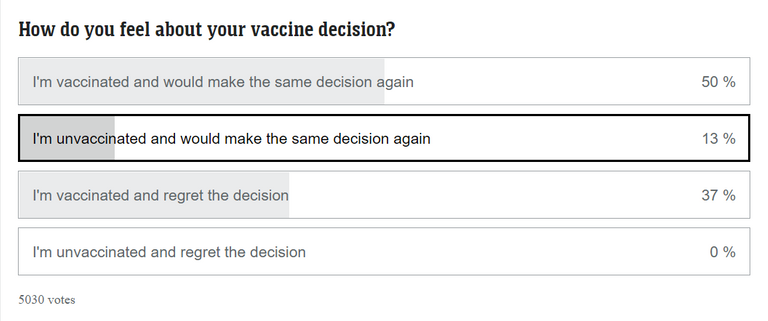
The poll has only been open for 30 minutes at the time of this sentence and there are 5000 answers taken on this question. Notice something? So far, out of about 800 people, not one of the unvaccinated regrets their decision and I would assume, that it isn't because they all managed to not get Corona, as it was everywhere.
Yet, 37% regret their decision and this could be because they were in the group that didn't get it (or didn't know they got it - remember, no symptoms doesn't mean no Corona), but there is this.
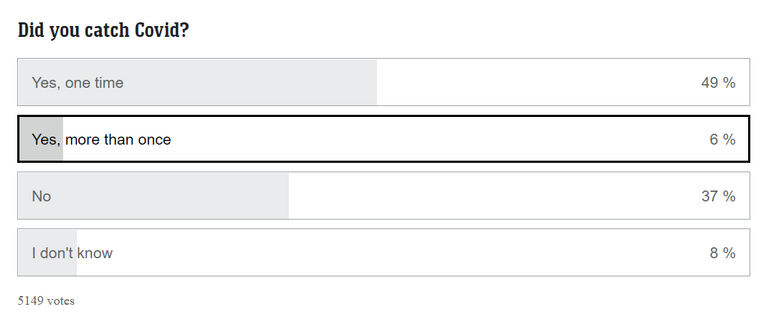
While 37% claim they didn't get it, if all the people who regret, regret because they didn't get it, that would also mean that all of the unvaccinated did get it. I am guessing there is some overlap. But, these numbers tell something too, because if you notice, there are some little things with the numbers that are a bit misleading.
We can work with a base of 100 people.
Out of 100 people, 13 didn't get vaccinated and 87 did. Out of the 87, we can see how many shots they had.
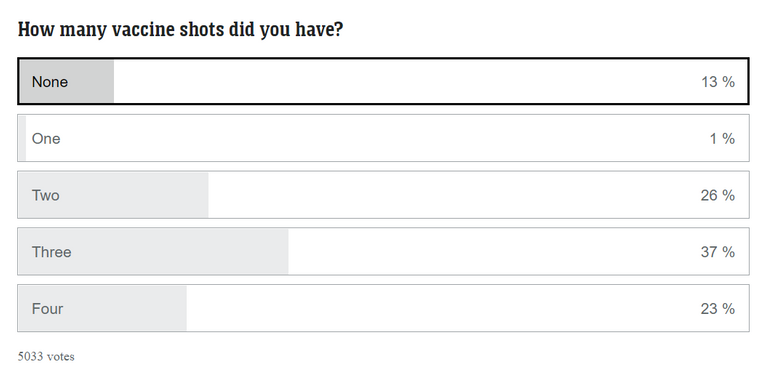
But, when we look back at the "regrets" results, there is a bit of funny business.
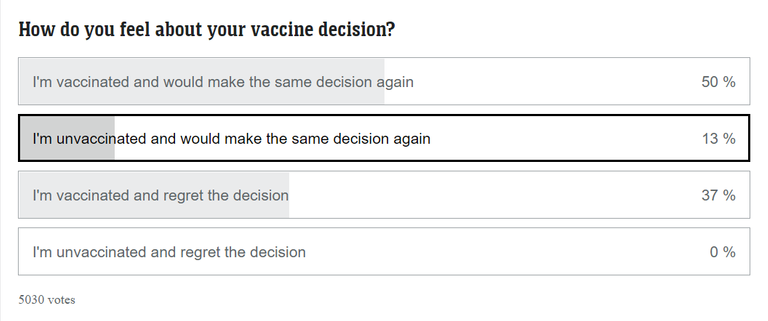
Out of our 100 base, 13 are happy and none have regrets.
But, we aren't working on the same scale any more, so we have to do some extra work to know how many are happy and how many have regrets for having their shots, because, these numbers shouldn't add up to 100, as they are now comparing using 2 different bases.
No vaccination has 13 people.
Vaccinated has 87.
50% of people who are vaccinated are happy with their decision, which is 43.5 people.
and you know what that means?
50% are not happy!
Not 37%
They way they are presenting the number excludes 11 people out of the 87 (25%) of the answers from the "not happy" category. pushed out to 5000 respondents, that 550 of the "not happy" responses omitted from the presentation and what this actually means is, that out of 5000 respondents, 650 are unvaccinated and happy with their decision and 2175 are vaccinated and not. That is 56%, more than half if given the decision again, wouldn't get vaccinated.
That is massive, because before, 87% of the total population, got vaccinated.
This would mean that with a do-over knowing what we know now, only 44% would get the vaccination.
This might be an oversight in the math, poor survey design or intentionally misleading, but it takes away a lot of the impact of the results, doesn't it?
And just to prove my point in bad design, I am checking back to see what happens and the latest with almost 8000 votes sees 1% increase in "unvaccinated" and a corresponding 1% decrease in "regret the decision" to be vaccinated.
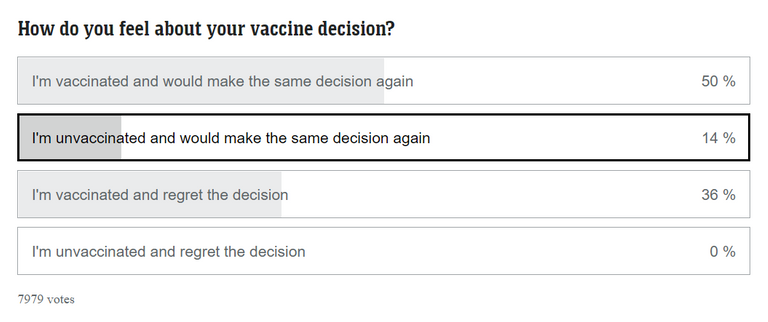
These things are not correlated, one should not affect the other. The only thing that can affect the regret or not is changes to people saying they regret or not, but as we can see, the "do it again" crowd numbers has remained static.
Math aside, there are also some obvious problems with this kind of survey, as obviously, being unvaccinated and happily living today, means there is a survivor bias. But, there is also bias in reporting on the regrets, because when people buy-into something like this, they are more likely to double-down on their decision, because it is too late to do anything else. There is no reversal of a vaccination - it is done. Because of this, I would suspect that if we could get an accurate reading on the "regret" situation, I suspect that there would be more regrets, more buyer's remorse.
And this whole debacle has been a "buyer's journey", where all kinds of mechanisms were used in order to convince people to get vaccinated, and it was very affective. Even now, the campaign continues, where even though it has recently been said that Pfizer didn't even test for transmission potential, they are saying that it is normal. So, if the vaccination didn't knowingly stop transmission, why were healthcare workers forced to get vaccinated to "protect" their patients, when they can carry and spread. How come only the vaccinated could fly, when they were transmitting it in the same way as the unvaccinated?
How come all of those dangerous unvaccinated people were arrested?
And in Australia, what about all of those people getting fined for being out of their curfew, collecting in too large groups, crossing borders to visit relatives?
I was watching House of the Dragon with my wife tonight and a great line was delivered by Mysaria in regards to the power of the King.
There is no power, but what the people allow you to take.
- Mysaria
And to close off at around 10,000 responses:
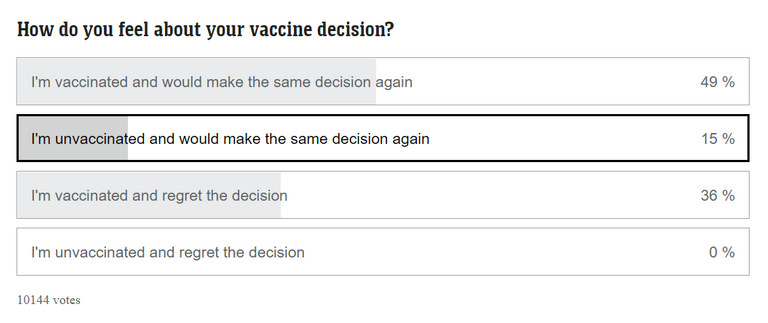
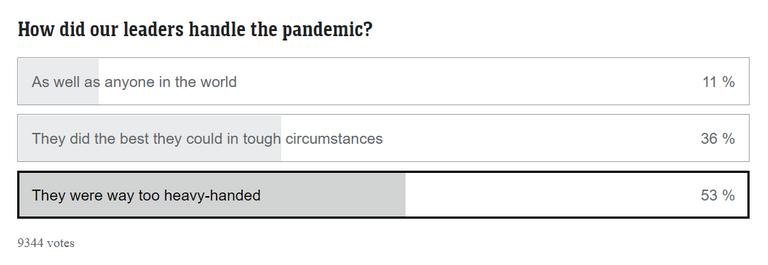
Regrets.
They can only ever be after the fact, but even hindsight isn't 20/20.
And by the way, this post isn't about vaccination, it is about information collection and distribution, how we perceive things, and how we are misled and influenced by what we are fed.
Taraz
[ Gen1: Hive ]
Some members of my family are in a high risk group ... ie they are over 90.
If I didn't get vaccinated and they got sick; I would be accused by my family members of attempted murder.
Yes, most of the people in my family are left-wing progressives.
Anyway, I've been happy with my decision to get vaccinated because it allows me to escaped a charge of attempted murder. The funny thing ... they all got vaccinated as well and the ones that got vaccinated got COVID19.
Crazy, isn't it? The truth doesn't matter, just what people believe to be true.
We were forced to wear masks to drop off our child to daycare, we give her kisses like all parents. She plays, hugs, swaps clothes, shares food with her friends - we pick her up in masks, give her more kisses.
Not exactly an operating theater... :D
Nearly everyone I know got it, many two or three times. The unvaccinated I know seem to have had the easiest time of it, which probably has bias in it too.
There’s always manipulation to these things for sure. They tried to scare people into oblivion with the UK data early on saying millions would die in 6 months. Based off a heavily biased algorithm but don’t worry about those little details, you simpleton! Just get it and shut up.
I think there’s definitely a lot of regret among the people who were hoodwinked into believing it was magic and rainbows instead of dangerous, untested and downright foolish to believe companies that have profits solely in mind, not you and I’s best interest, would be any different or that they would care. The companies don’t give a shit, they just want money and immunity from litigation. They’ve gotten both and now that people are regretting it there’s no recourse because they’ve allowed it to happen.
I also think it’s absurd to discuss for any reason what so ever someone’s personal medical choices, especially in a public forum.
I think at the end of the day I’m disappointed in people not being more skeptical but I guess they don’t see the cycle of crap. Every 3 years or so it’s something different. Swine flu, h1n1, Ebola, Zika, it happens every 3 years or so. Let’s hope that people are going to be aware that this is a cycle of fear porn and the next one is without a doubt going to happen. Will it be this year, next year or the year after they will foment and push it.
The only way to not regret it is to take a step back and remember what happened last time.
Not to mention misreporting, where people were considered "dead from Corona" even if they died two months after having it, or died in a car accident with it.
What happened to some of the sports people was absolutely disgusting. Same for all the people that got fired over this for standing their ground.
Fear does funny things to people.
Dude, don't forget that you wrote everything on the blockchain. You can't revise history, we all remember you didn't get vaccinated because you were sure it was a scheme to track you with microchips.
"I'm unvaccinated and regret the decision" should be reworded to "I'm too dead for data collection".
I'm kidding, I'm kidding, don't go crazy on me Hive.
I imagine most respondents forget that the vaccinations for Alpha and Beta did slow down transmission, but then Omicron totally destroyed all of that. Hindsight is a beautiful thing, but I do think that if the survey had information of Australian deaths vs Brazil, USA, or Japan, people might answer very differently.
Lolol!
I have a policy:
No chips in me, unless they are salt and vinegar.
I HAVE THAT SAME POLICY!
:D
No chicken salt!!??
Guess Finland has really changed you.....!LOLZ
lolztoken.com
Mediocrates
Credit: reddit
@tarazkp, I sent you an $LOLZ on behalf of @boboman
Use the !LOL or !LOLZ command to share a joke and an $LOLZ
(1/2)
This is only my point of view, NOT the absolute truth. What we feel and think is a distortion when we do not differentiate the real facts from our own interpretation,
Many times the distortion arises from our ego, our wounded child who victimizes or minimizes, and gets angry, or with the critic who judges, blames, condemns and punishes not letting us see clearly and when it is so the damage is not for others but for oneself Mr. Taraz ... here thinking out loud.
in my family, I don't know if it was because of covid or fear, three people died in my family in one week... I still wonder what happened?
The fear factor is an interesting metric to put in, because when in fear, everything tends to affect us more heavily. The other thing is that when there is a strong flu going around, people who are at risk will be affected anyway, so is it Covid, or just natural? I know people who were upset that their grandparents in their mid 90s died, as if it was a surprise.
Is it Covid, or just natural?
In my family's experience all three people were unvaccinated, it was unexpected, I think the fear flaunted its power to minimize the immune system. They were not elderly. The ages were in the '40s, with two brothers and their 65-year-old mother.
People in their 90s are touching the runway to take flight as airplanes live via satellite, as my grandmother would say.
Totally unscientific anecdotal evidence, but the four people in my household all got vaccinated (since I have three risk factors, five times in my case) and none of us have contracted Covid.
OTOH, my son (who doesn’t live with us) also got vaccinated but got slammed by Covid twice.
Anecdotal again from us - my wife was worst hit, she had taken one shot. Daughter and I are the ones with the risk factors, but hardly affected. Even my wife though, only missed one day of work.
In early 2020 (January) there was a sales meeting and on the way back, from there the plane was filled with Chinese tourists. Nearly everyone that attended the meeting (not me) got a very bad flu, but at that point, Corona wasn't a publicized thing, so they just got on with their week once recovered.
I think there are also other factors that affect who gets badly hit or not, but I am not sure if the vaccination does much overall.
It will be interesting if all the numbers are collected and independently verified and compared globally. I might sound like a conspiracy nut, but I don't trust the numbers given, there are too many holes.
I don’t know if this will even be possible. Decent statistics could probably be had from testing clinics, but after home tests became widely available, how could those results be tallied?
I was against any vaccine as I believed that coronavirus was not natural (still think so). However, it is kinda me and many people were forced to get vaccination. For example, I would have had to take test every weekend to go to office if I hadn't got vaccination, and so on.
Now me and many people around me regret having got vaccination. We don't know what we were injected, what its future side effects will be. Crazy queations in my mind :)
And the biggest issue is barely talked about - it affected women's reproduction cycles heavily. What does that mean for all of those who are yet to have children, and their babies? History has pretty good evidence that this should be treated with extreme caution.
Just to add to the poll:
I am vaccinated with 3 shots, including my wife and both kids. We don't regret it. We will do it again if necessary under similar circumstances.
We don't wear mask anymore, unless required by regulation. We were never afraid of the afraid of the decease. We have travelled all over during 2020 and 2021 (blockchain have evidence), and continue to travel all over the world in the post-covid environment. Our children were infected once that we know of, may be other times that we didn't know of. As far as we know, none of us parents were ever infected. Children had minor symptoms, when they had it they were not isolated, yet we didn't catch it.
PS. I missed the leader question. In the US and all over the world I felt the situation was unscientifically handled and too politicized for no good reason. In some countries that I have travelled and been, it was very heavy handed. Where I live, in the United States, it was NOT heavy handed by the leaders.
Did you guys do the tests? I tested negative with the at home tests, positive with the official one. I stopped doing the tests, like many people, but suspect I had it multiple times.
And this is the next problem. At some point, there will be cause for vaccination against something and, because of the way this has been handled, it will be rejected.
If I was a conspiracy theorist that believed it was for something like population control, I wouldn't make the first run the real one, it would be the one to destabilize belief and make people not want vaccinations - and then release the real one.
Yes we did the tests, both at home and PCR in a lab. It was negative. Kids were positive though, when they caught it. They were not sick (just like a cold), and they were vaccinated at the time. During the first couple of years, 2020-21, during travel we had to do many PCR tests. I have probably done upwards of 50 total tests, all negative. That is another way is a booming business over the last few years, the business of tests.
https://www.theguardian.com/world/2020/mar/26/uk-police-use-drones-and-roadblocks-to-enforce-lockdown
2 years on and it's still being ridiculed. Walking your dog in an isolated location spreads the disease. It made headline news at the time.
Talk about OTT. People were getting fined.
Yep, there was a lot of insanity. Some people who had a wedding with too many guests was fined 400K dollars.
Dear my friend @tarazkp!
I always love and respect your courage and honesty!
Surely if you live in the world I live in,
You will obviously be sentenced to three to five years in prison.
defamation in k
Criminal defamation provisions threaten freedom of expression
What if @tarazkp is sentenced to prison for slandering, insulting, and distributing false information to the sacred state and ruling classes?😯
I would rather be a martyr for what I believe in, than complicit in what I don't.
The closest I had to COVID was a nasty respiratory bug in February 2020, a month before the 'Rona was officially here. I am unvaccinated, and do not regret my choice. I don't buy all the claims about the Fauci Ouchie killing epople as a plan to exterminate the population any more than I believe the virus was an escaped bio-weapon, but I don't trust the pharmaceuticals industry rolling out a new technology via a state-backed propaganda campaign either.
The conspiracies are wide and varied and mostly insane reactionism by people with an agenda, but it is far more basic than that. As you said about the Pharma companies, they are companies built for profit, and that comes at any cost. I don't trust Nike to look after my feet either, or Facebook to have my data privacy at the top of their agenda.
Indeed. And while I don't see profit as inherently corrupting, I do see corporations shielded from liability and supported by taxpayer subsidy as deeply corrupt.
The incentives are misaligned to achieve public/ society benefit.
Looked about like that when I was looking at it and I looked at it well after you did (recently and it was multiple tens of thousands).
The comment section was "entertaining" too.
I haven't looked at the comment section - :)
Interesting:
Less than 12 hours for commenting?
If it's not a standard thing (and even if it is a standard thing it's monumentally stupid), maybe they had too many detractors?
I am guessing it was devolving too fast - not getting enough support for the happy with vax perhaps :D
That's kind of where I was going ^_^; I have no idea what it looks like now, I sent J the link earlier as he couldn't find it and he was skimming the comments, still looked "interesting" apparently (and he had the comment box at the bottom of his screen at the time so must have been just before they closed them).
Directionally, the numbers could be explained like this:
There are so many sides to this, which makes it such an interesting case study on humanity, especially since it was applied globally in different ways. What was "best" is hard to say, but I think that the overreaction was unwarranted, especially for two full years.
Interesting. I know there are those who regret being vaccinated while others are diehard sold on the jab and probably would do it a thousand times,. As for me, I am unvaccinated and damn proud of not taking the jab. Some folks thought it was an IQ test. Yeah, I am a conspiracy theorist as well. I do not believe the powers that be that state it was safe and effective. To many are dying and too many disabled and sick.
States are ineffective at innovation at the best of times, let alone under duress and with need for speed. The Pharma companies are for profit organizations. Combine the two and there is a lot of room for error.
I had two shots. Have no intention to get another. as far as I know I never caught covid. I am also glad that we no longer have to wear masks.
I think most people got Covid - it just didn't affect most people, so they didn't test. I had it at least once where it was officially tested, but I suspect two or three times.
Well, to whom it may concern... I am also one of those who has not been vaccinated yet! ;o)
Any takers?
I'm just waiting. There is no worse publicity than the one that is not done! :D
I hate it when people fiddle with stats to present them in a way that suits their agenda. You see it all the time where they take the x axis out of San equation or truncate a graph to exaggerate something. Buggers!
It is likely just very bad logic in this case - Australians. :D
Lol. There is that 🤣
I couldn't be bothered with that shit. Was more interested in watching folks pick teams, freak out, and brainwash one another. You've probably heard me say a few times how I'll observe media, rather than consuming it.
Didn't drink the koolaid either. Wasn't pressured and saw no need. Figured if it was my time to die, I'll just go do some cool shit in the meantime. Some of these silly humans were convinced the world was ending, yet all they did was sit on their devices. And they still do that I guess. Seems like a waste...
And there is a difference, albeit subtle that many don't seem to understand. It is about framing.
I reckon the "world is ending" is what drives most people now - it doesn't matter what the cause, it is all given the same weighting. It is much like all of the social movements, no nuance.
Regardless of which 'side' people want to latch onto, once modern politics is applied to the media circus, to the observer those groups resemble ancient tribes dancing around a large fire at night. All they can see is one another, feeding of each others energy, gathering comfort from the heat, creating the illusion of power and strength in numbers. Can't see beyond the glow though. What they see as light is actually amplifying the darkness. Anyone else on the outside can see and hear them from over a mile away, can approach and observe/study without being seen or heard, gather whatever might be useful as they distract one another with song and dance, then leave without a trace.
The consumer approaching that can only be afraid of what they see, or feel the need to join and fit in in order to alleviate those fears with a false sense of temporary belonging. And I say temporary because those same bonds might not be there once the media begins pushing the next thing.
Yes, and the "real news" of all the injuries and still as yet undiscovered injuries and deaths, and worse than death injuries are just starting to surface. All those involved in selling the lies and forcing it upon others should be put in jail.
But, few will be tried, let alone jailed. The injuries and harm caused in other ways are quite profound. I know people who lost their last chance to have a child due to miscarriage just after getting the shot.
Many people who aren't sorry are actually sorry, too. They just don't want to admit to themselves that they made the wrong choice. I have experienced this many times myself. That's why I often stop to have a heart-to-heart talk with myself and identify this crap to myself.
I haven't been vaccinated, but if I had to fly somewhere, I'd do it. Although in our countries of corruption you could buy a vaccination certificate. Not very expensive, as far as I remember. About $100. And there were a lot of buyers. Which of us is crazier in the end? I'm not really sure...
Exactly. Hard to admit to mistake when it can't ever be corrected.
I would buy a pass if I had needed, if it was available. Here, the corruption for such things is low.
💪 After your post, I would have already bought one too... 😅
We didn't get the vaccination in our household of 2 adults, we had Covid once. It was like a strong cold. My husband has Cancer but his Oncologist was the only medical professional that didn't want him to get vaccinated. (he didn't) The quote his doc used.. "When we reprogram the immune system to fight one thing specifically, we don't know what else it isn't doing". Being a Oncologist, he understood the MRNA approach better than most medical professionals.
I don't regret my choice, in fact I feel very comfortable with it.
I never understood those who were obsessed with other's medical choices, we all have different bodies, immune system and values, it was and is my opinion that people should read both sides of the debate, talk to their "Trust counsel" and make a choice. It was obvious early on that the vaccines didn't stop transmission, so there is no reason for anyone to pressure anyone else.
That is interesting, and sorry about the cancer in the family. Hopefully things are going well with it.
My neurologist (after the stroke) was 50/50 on it, saying "it probably won't do any harm, but it might not do any good either - it is your body".
I think it is a power thing, in this case, social power. The "ruling class" were those who followed the recommendations and could take what they perceived as the moral highground over others - "Don't you care about other's wellbeing?". Since it doesn't stop transmission, it was never the question to ask. And for the same reason, it was never a reason to stop unvaccinated people from travelling.
Cancer is a miserable disease which eats at your body, life and finances over time. Thank you for the well wishes, at this point in the battle we are just tired, but hanging in there. Covid hysteria made the entire horrific experience even worse. But I'll not get into it here.
The media turned those who watch and believe without question into little soldiers and marketers for some of the worst corporations in the world. Pfizer.. It was weird how some people just watched the news and then automatically knew what everyone else should do even if there was a lot of evidence fairly quickly about what they were pushing didn't align with reality.
Being optimistic here, I think the best thing to come out of Covid is a better understanding of the power of Big Tech, Media and the government when they work together, while some will not talk about it yet, cause they think it's working in their favor.. Never before have people had more reason to question.. "official narratives" also known as state propaganda.
Wow this is so interesting! If only they had such a poll in my country. I wonder how the results will turn out. Thanks for sharing!